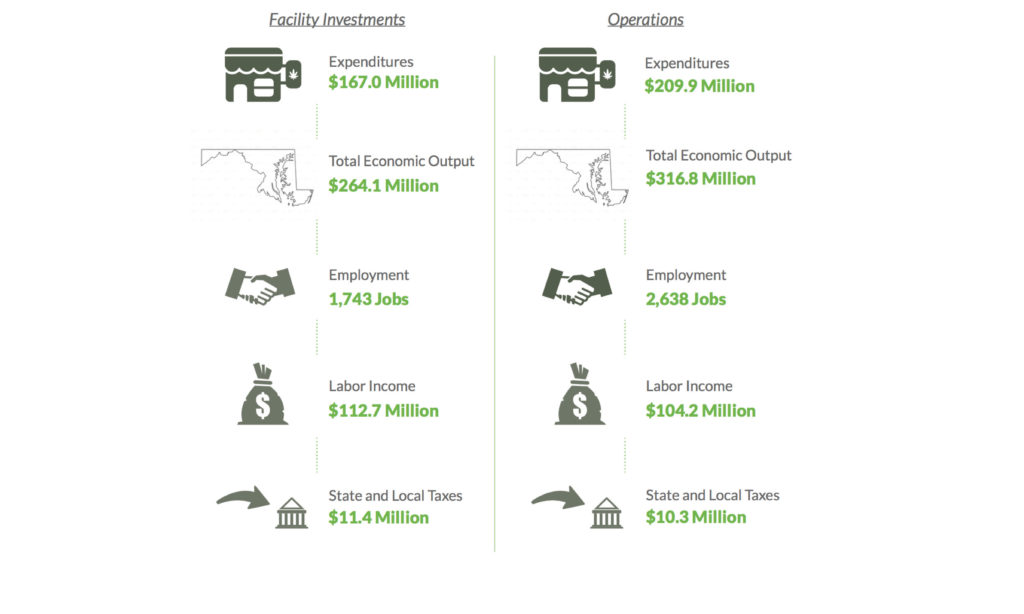The Maryland Cannabis Wholesale Association recently released an economic impact analysis conducted by California-based independent research firm Beacon Economics that shows the wide-ranging economic impact of medicinal cannabis. According to the report, the industry has added 4,000 jobs to the state and generated 21.7 million dollars in tax revenue and overall, “contributed over $580 million to Maryland’s economy.”
Currently, there are 84,400 patients—that is in a state with a little over six million people—and throughout last year, there were more than 3,770 patients added each month with “an average monthly growth of 5.7%.” And overall, medicinal cannabis has “had a dramatic effect on Maryland’s economy,” the report says: “Facility investments generated more than $264 million in economic output, while operations of processors and growers have contributed $316.8 million to the economy. Employment and labor income have also been positively affected. Facility investments and operations of processors and growers have netted the state over $21 million in total scale revenues.”
The report also compares Maryland’s medicinal cannabis program to the United States’ overall and notes that Maryland’s fairly new industry has a great deal of “potential for expansion.” It also mentions the nationwide profits since 2012: “Between January 2012 and a December 2019, $811.56 million was invested in the U.S. medical cannabis industry. To put that figure in perspective, and to illustrate the industry’s explosive potential, $240 million of it was invested this year compared to just $35,000 in 2012. In early 2019, $90 million alone was invested in a single company, Grassroots Cannabis of Chicago.”
There are, however, two things in the report worth unpacking that have mostly gone unnoticed by the many outlets who have reported on only the basic findings of the report.
A curious aside in the report notes that, “across the nation, millions of dollars are being invested in research and development for treatments involving cannabis,” and then references Johns Hopkins University’s fall of 2019 announcement surrounding psychedelics research. Last year, the university said that through a number of private donors who gave a total of $17 million, Hopkins will establish the Center for Psychedelic and Consciousness Research at Johns Hopkins Medicine, which will develop research about the use of psilocybin for therapeutic use.
“For example, in the Fall of 2019, John Hopkins University announced the first-ever US-based facility dedicated to researching the use of psychedelics in the treatment of addiction, Alzheimer’s disease, depression, and many other disorders,” the report explains.
How this is an example of cannabis research and development is not clear. And then the report returns to cannabis: “The number of states that have legalized medical cannabis has spurred increased investment in the industry.” Psilocybin has been decriminalized in a few states around the country, and Washington, D.C. has also been considering the policy. It is likely in the coming years that medicinal psilocybin could become its own industry similar to medicinal cannabis.
While the economic analysis primarily sticks to just that—analysis—it does go into some more pointed talking points about additional growth of medicinal cannabis, talking points that reflect the stance of The Maryland Cannabis Wholesale Association.
“Licensing will also play an important role in the industry’s long-term growth. For example, the substantial investment that was made by growers and processors during their start-up was based on seeing returns on these investments,” the report says. “A significant uptick in licensing would reduce these returns, potentially deterring investments by companies already in the market and those entering. As a result, the state of Maryland should be cautious in how it issues licenses in the coming years, focusing on sustained and equitable growth for the industry.”
This argument was essentially repeated by Joe Bryce, a lobbyist for The Maryland Cannabis Wholesale Association, when he testified in Annapolis last week in opposition to a bill that would remove the cap for how many growers and processors can be awarded licenses. There, Bryce referred to many “things that come into play,” with an uncapped market. He argued for continued restrictions on the number of licenses given out to growers and processors because initial investments were made in large part because of the initial limited number of licenses.

